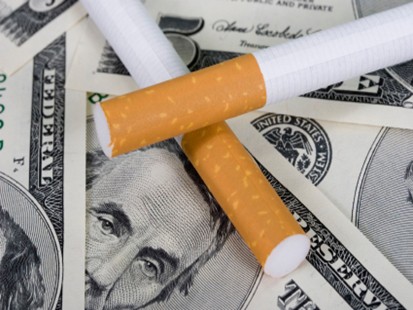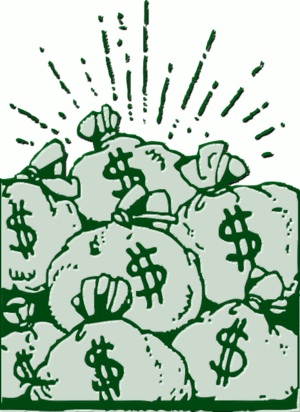Submitted by Anne Landman on
Throughout the 1980s and 1990s, the U.S. tobacco industry enjoyed tremendous success in beating back tobacco tax increases at all levels of government. But as the industry becomes ever more reviled and the economy goes further in the tank, raising cigarette taxes has become a much easier political proposition. Twelve states raised their cigarette tax in 2007 and 2008, with proposed legislation to do the same in 17 more states, as of February 2009. The federal government recently approved a tobacco tax increase of almost 62 cents per pack. When it goes into effect on April 1, it will bring the total federal tax on a pack of cigarettes to $1.00, to help fund the State Children's Health Insurance Program.
 It's a far cry from the heyday of Philip Morris' (PM's) national public relations and communications machine, whose sole purpose was to trounce any effort to raise tobacco taxes at any level of government. Throughout the 1990s, PM would unleash its formidable arsenal at the first whiff of a tax effort. Its tactics included fake "grassroots" organizations, legions of lobbyists, video news releases to ensure favorable "news" coverage, anti-tax messages on their products and widely-disseminated economic studies predicting disaster if the tax should increase. In the 1980s and early 1990s, the Tobacco Institute had a similar PR machine in place, creating a bulwark against tax increases that may be unparalleled in history.
It's a far cry from the heyday of Philip Morris' (PM's) national public relations and communications machine, whose sole purpose was to trounce any effort to raise tobacco taxes at any level of government. Throughout the 1990s, PM would unleash its formidable arsenal at the first whiff of a tax effort. Its tactics included fake "grassroots" organizations, legions of lobbyists, video news releases to ensure favorable "news" coverage, anti-tax messages on their products and widely-disseminated economic studies predicting disaster if the tax should increase. In the 1980s and early 1990s, the Tobacco Institute had a similar PR machine in place, creating a bulwark against tax increases that may be unparalleled in history.
While the tobacco industry's PR machines have since lost effectiveness, their arguments still influence debates today. Blogs and editorial pages around the country repeat the industry's anti-tax arguments. For example, a February 22, 2009, editorial in the Daily Herald of Wausau, Michigan, opined that cigarette taxes are regressive, hitting poor people the hardest; that raising the cigarette tax would stimulate smuggling; and that there is essentially no relationship between taxes and smoking rates. Every one of these time-worn arguments can be found in a 1983 Tobacco Institute report titled "New or Restated Economic Arguments Against Excise Tax Rate Increase on Cigarettes." More importantly, all of them have been disproved by historical experience.
Do cigarette taxes disproportionately burden the poor?
It is true that poor smokers spend a greater percentage of their income on cigarettes, and that a larger percentage of poor people smoke than rich people. However, the benefits of an increased tax will accrue to those who bear the burden of paying the tax.
As cigarette prices increase, people tend to smoke less, quit altogether or fail to take up the addiction at all. This leads to improved health among poor communities, as well as significant savings for low-income former smokers. Teenagers, who are often counted among the poor, are disproportionately affected by tax increases. Tobacco companies know this. PM marketing researcher Myron Johnston wrote in an internal report titled "Teenage Smoking and the Federal Excise Tax on Cigarettes":
[A] ten percent increase in the price of cigarettes would lead to a decline of 12 percent in the number of teenagers who would otherwise begin to smoke. ... [I]t is clear that price has an pronounced effect on the smoking prevalence of teenagers, and that the goals of reducing teenage smoking and balancing the budget would both be served by increasing the Federal Excise Tax on cigarettes.
Nearly thirty years ago, the industry secretly recognized that raising cigarette taxes would curb teen smoking while boosting public revenue.
Does raising cigarette taxes lead to smuggling?
If a state raises its tobacco tax substantially above that of neighboring states, it can lead to cross-border cigarette smuggling. That's why the tax rates of neighboring states are usually taken into account when a tax increase is being considered. It's a simple matter of good public policy to set cigarette taxes at a level that will discourage -- or at least won't encourage -- smuggling.
In 1994, in response to efforts to increase tobacco taxes in Arizona and Colorado, R.J. Reynolds formed a front group called the National Coalition Against Crime and Tobacco Contraband (NCACTC). The NCACTC hired Rod Stamler, a former assistant commissioner of the Royal Canadian Mounted Police, to "study" cigarette smuggling in Arizona and Colorado, and disseminate the results to the media in those states. A 1994 RJR letter stressed that NCATC's tobacco ties must remain secret. Another document drafted for NCACTC "members" by RJR suggests highlighting stories of retailers who had multiple robberies after a cigarette tax increase. It warns, "The United States ... may soon be on the verge of a return to smuggling and a black market not seen since Prohibition."
The tobacco industry has not only fanned fears of smuggling, it's actually created and stimulated smuggling rings, to pressure governments to roll back cigarette taxes. The most famous example involves Canada, which in 1991 doubled its tobacco tax. The following year, RJR subsidiary Northern Brands devised a convoluted scheme to smuggle cigarettes into Canada through the St. Regis Mohawk / Akwesasne Indian Reservation in upstate New York. RJR's scheme fleeced the Canadian and U.S. governments out of hundreds of millions of dollars in income, and the surge in black market sales led Canada to roll back its tax. The scam even allowed the industry to point to Canada as "an example of a country that was devastated by cigarette smuggling" in the wake of a tax increase.
Eventually, RJR's smuggling arrangement was discovered, and Canada sued RJR in U.S. courts. RJR's Northern Brands pleaded guilty and paid $15 million in penalties. But they weren't the only ones -- British American Tobacco, Brown & Williamson and Philip Morris affiliates have all been implicated in smuggling schemes around the world.
Where does the money go?
 While the smuggling and regressive tax arguments are largely specious, it's important to carefully consider where the funds raised by a tobacco tax increase will go.
While the smuggling and regressive tax arguments are largely specious, it's important to carefully consider where the funds raised by a tobacco tax increase will go.
A frequently cited and pragmatic goal of raising tobacco taxes is to discourage smoking. This means that cigarette sales -- and tobacco tax revenue -- will also decrease over time. Therefore, tobacco taxes should be used to fund needs that will similarly diminish. Examples include smoking cessation programs, health care assistance for smokers suffering from lung disease and medically-supervised nicotine addiction therapy and treatment.
While using cigarette taxes to fund the State Children's Health Insurance Program (SCHIP) may be appealing, its cost will almost certainly rise over time. Even worse, relying on cigarette taxes to fund such a crucial healthcare program makes government dependent on stable or increased smoking rates, for continued healthcare funding.
How governments use cigarette tax money determines whether they have a responsible relationship with the tobacco industry. To be responsible, the relationship must be in the best long-term interests of the public health, not the tobacco industry. Philip Morris long ago recognized the benefit of cigarette taxes that create government dependency on the industry, because they essentially turn government into a financial partner -- a relationship that strengthens the industry's future. Its 1987 strategic plan stated, "To the extent that governmental bodies tend to regard this [tobacco] tax as 'cash flow' there is a degree of reluctance to destroy the industry."
What are the arguments in favor of raising cigarette taxes?
There are many good reasons why government would want to increase tobacco taxes: reducing cigarette consumption, encouraging smokers to quit and discouraging teens from even trying cigarettes. In the longer term, if used correctly, cigarette taxes can help wind down and eventually eliminate nicotine addiction.
Once the misleading anti-tax arguments promoted decades ago by the tobacco industry's PR machine are discounted, the benefits are clear.
Perhaps the single, best argument, though, is that -- unlike taxes on food, gas or homes -- no one has to pay a cigarette tax, if they really don't want to.
Anne Landman is the editor of the TobaccoWiki collection on SourceWatch.

Comments
Anne Landman replied on Permalink
Philip Morris says taxes reduce cigarette consumption
Anonymous replied on Permalink
One size fits al!
Anonymous replied on Permalink
Cigarette taxes help the children
Anne Landman replied on Permalink
E-cigs not taxed like regular cigarettes
Anonymous replied on Permalink
Specious at best, Propaganda irregardless
Mutternich replied on Permalink
Did it ever occur to you
Anne Landman replied on Permalink
I have a suggestion for you...
Anonymous replied on Permalink
I have a better suggestion
Sheldon Rampton replied on Permalink
I'm afraid you're wrong
Anonymous replied on Permalink
Mad as hell
Pages